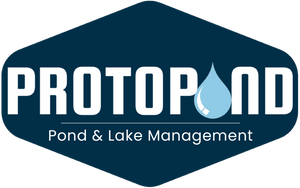Do Goldfish Eat Algae and Are They Effective Algae-Eating Fish?
Maintaining a clean and balanced pond is every pond owner's goal. One of the biggest concerns for pond keepers is the rapid growth of algae, which can cloud the water, compete with plants for nutrients, and disrupt the pond's ecosystem. Many fish species are known to feed on algae, but when it comes to goldfish, the question is can they truly help control algae growth?
In this blog post, we’ll dive deep into the relationship between goldfish and algae. We’ll look at their eating habits, their effectiveness in algae control, and what you should know before relying on goldfish to clean your pond.
Understanding Goldfish Diet in Natural and Pond Settings
Goldfish are omnivores. In the wild and in pond environments, they feed on a variety of food sources such as insects, larvae, plant material, detritus, and algae. They are opportunistic feeders, meaning they will eat what is available in their environment.
Algae, being a common and accessible food source in ponds, often becomes part of their diet. However, it is important to understand that algae is not their primary food. Goldfish typically consume it when other food sources are limited or during their natural foraging behavior.
Do Goldfish Eat Algae?
Yes, goldfish do eat algae, but only in small amounts. They will nibble on soft green algae growing on rocks, plants, and other surfaces in the pond. The most common types of algae goldfish consume include:
- Soft green algae
- String algae (to some extent)
- Filamentous algae (mildly)
However, goldfish do not actively seek out algae as their main source of nutrition. They tend to graze on it while searching for other food items. In most cases, they treat algae as a snack, not a staple.
Are Goldfish Effective in Controlling Algae?
This is where expectations need to be managed. While goldfish contribute to algae control, they are not powerful enough to keep an algae bloom in check on their own. Here's why:
1. Limited Appetite for Algae
Goldfish are not as efficient as dedicated algae-eating fish like plecos or Siamese algae eaters. Their consumption rate is low, which means they may help reduce algae slightly, but they cannot eliminate it.
2. Feeding Habits
Goldfish prefer flakes, pellets, live food, and vegetables. If these are present in the pond, they are more likely to ignore algae.
3. Waste Production
Goldfish produce a lot of waste. If the pond is overstocked or if filtration is weak, their waste can increase nutrient levels in the water. This can lead to more algae growth rather than less.
4. Pond Conditions
Goldfish thrive in cooler water, which may naturally slow algae growth. But temperature, sunlight exposure, and excess nutrients are stronger influencers on algae blooms than fish activity alone.
Goldfish vs. Other Algae-Eating Fish
If your primary goal is algae control, it might help to compare goldfish with other species commonly used for the job:
|
Fish Species |
Algae-Eating Efficiency |
Compatibility with Goldfish |
|
Goldfish |
Low |
Excellent |
|
Plecostomus |
High |
Poor (tropical species) |
|
Koi Fish |
Low to Moderate |
Excellent |
|
Siamese Algae Eaters |
High |
Poor (warm water needs) |
|
Otocinclus Catfish |
High |
Poor (fragile, tropical) |
As the table shows, goldfish are not the top algae eaters, but they are ideal companions for pond ecosystems, especially if you're looking to maintain a community of cold-water fish.
Goldfish and String Algae
String algae is a tough opponent. It's long, thread-like, and tends to grow in thick clumps. While goldfish might nibble at it, they cannot eat enough to make a noticeable difference. In fact, some pond owners report their goldfish avoiding string algae altogether.
To control string algae effectively, you need a multi-step approach, not just fish.
How to Use Goldfish as Part of a Natural Algae Control Strategy
If you're set on using goldfish to assist with algae control, consider combining them with other pond maintenance techniques. Here’s what works best:
1. Limit Excess Nutrients
Goldfish produce waste, and leftover food decomposes into nutrients that algae feed on. Use high-quality food, avoid overfeeding, and clean the pond regularly to keep nutrient levels low.
2. Add Aquatic Plants
Plants like water lilies, hornwort, and anacharis compete with algae for sunlight and nutrients. They help starve algae while creating a healthy habitat for goldfish.
3. Install a UV Clarifier
UV clarifiers help kill floating algae spores before they bloom. While goldfish can’t eat floating algae, this tool helps control green water.
4. Improve Filtration
A strong biological filter can reduce ammonia and nitrate levels, which helps keep algae from spreading. A properly filtered pond supports both fish and plant life.
5. Avoid Overstocking
Too many goldfish can overload your pond’s ecosystem, leading to water quality problems. Keep stocking rates appropriate for your pond size.
Can Goldfish Help Keep a Pond Clean?
Goldfish do help in their own way. They stir up debris as they forage, which can aid your filter in removing suspended particles. Their nibbling can slow algae growth in certain areas. But overall, they are more ornamental than functional when it comes to algae control.
If you're looking for a cleaner pond, goldfish can be one part of the equation — but they should not be your only solution.
Final Thoughts
Goldfish are beautiful, hardy, and a joy to watch. While they do nibble on algae occasionally, they are not a reliable or effective solution for full-scale algae control in ponds. They can contribute mildly to algae management when combined with the right mix of aquatic plants, proper filtration, and regular maintenance.
If your pond is facing a serious algae problem, you’ll need a more comprehensive strategy. Goldfish can play a supporting role, but they won’t win the battle alone.





